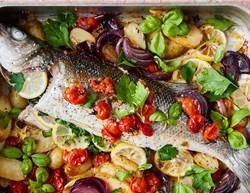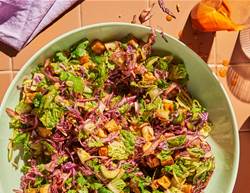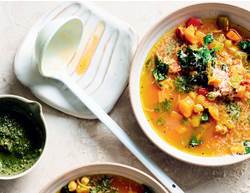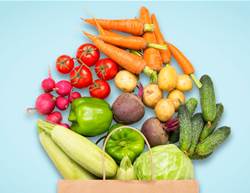Registered dietitians dish up their best advice for staying fit and healthy for decades to come.
As you’ve ventured into your 40s, you may have noticed that your energy crashes more quickly than it used to. Or maybe you’ve gained a few kilos around your middle—despite the fact that your diet has remained basically unchanged for as long as you can remember.
It’s not your imagination. As women near their 40s, basal metabolic rate decreases, oestrogen levels dip and blood vessels decrease in elasticity. These factors make it harder to stave off belly fat, and also increase the risk of heart disease, cognitive decline, and osteoporosis, says nutritionist Maggie Moon. “The good news is that what we eat—something we all do each day—can make a big and lasting impact.”
Here, 10 simple tweaks you should make to your diet in your 40s that can help you stay lean and healthy—for life:










Up your calcium intake.
“As oestrogen production decreases in ageing women, it becomes harder to absorb calcium,” explains nutritionist Rebecca Scritchfield. And since the risk for osteoporosis increases with age, this nutrient is vital for your health. “Women over the age of 50 should aim for roughly 1,200 milligrams of calcium daily, and women in their 40s should shoot for around 1,000 milligrams calcium per day.” That comes out to about three to four daily servings of calcium-rich foods—and this doesn't only mean things like yogurt, cheese and milk. Many cereals and plant-based milks (like almond or soy) are fortified with calcium, and dark leafy greens like kale, spinach and collard greens are other great options.Eat more protein.
This is key for both meals and snacks; basically, you want to have protein on your plate whenever you eat—no excuses. You lose muscle mass as you get older, and protein (along with weight lifting) helps you preserve and enhance lean muscle, making it a particularly key nutrient. “Interestingly, research suggests your body can use protein more effectively for muscle-building when you include protein-rich foods throughout your day,” explains nutritionist Christy Brissette, president of 80 Twenty Nutrition. As a general rule of thumb, make a protein-rich food a component in every snack and strive for 30 grams of protein at every meal. That means you'll need about 125g of chicken, fish, lean meat or plant-based protein like lentils, beans, or soy. “For snacks, include an ounce of nuts, two tablespoons hummus or nut or seed butter to meet your protein needs,” adds Brissette.Cut back on sodium—especially sneaky sources of it!
“Bloating is very common during menopause, and a high-sodium diet can not only exacerbate bloating but also be a major contributor in the first place. This is where label reading is key; don't rely on how salty a food tastes,” advises nutritionist Andy Bellatti. “Many people don't realise, for example, that a serving of salted peanuts contains the same amount of sodium in a slice of bread or a cup of milk.” Unexpectedly, many salt-loaded offenders often lurk in the baked goods aisle. Sweet products like muffins, cookies, and breakfast cereals can be loaded with the stuff. In fact, most coffee shop muffins have as much sodium as four servings of potato chips, Bellatti cautions. Salad dressings, condiments, jarred sauces and packaged frozen entrees are other salt-laden offenders.
Eat two weekly servings of oily fish.
Hormonal changes occur as you approach menopause that increases your risk of heart disease, while diets rich in omega-3 fatty acids have been shown to reduce your risk of cardiovascular disease. So if you haven't already, it’s time to befriend omega-3-rich fish like salmon, mackerel, sardines, trout, and herring. “EPA and DHA are omega-3s found in fish and fish oils that you need to keep your brain, heart, and eyes healthy as you age,” Brissette says. Aim for two palm-sized servings per week. Another reason to eat more fatty fish: “As you get older, your skin produces less vitamin D in response to the sun. Oily fish is an excellent source of vitamin D, so it's another win for nutrition in your 40s,” Brissette says.










